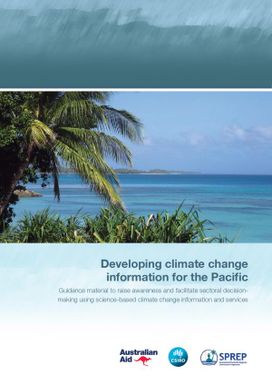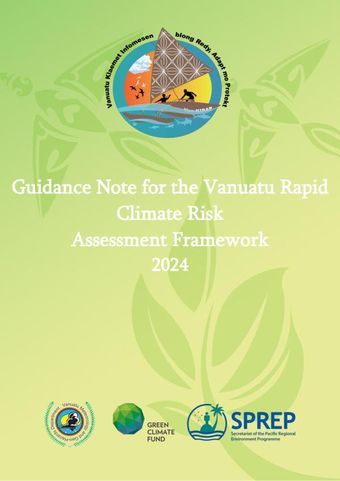Developing climate change information for the Pacific : guidance material to raise awareness and facilitate sectoral decision-making using science-based climate change information and services
- Description:
- Small island developing states (SIDS) are among the most vulnerable to our changing climate. People living in the western tropical Pacific SIDS are already experiencing higher temperatures, shifts in rainfall patterns, rising sea levels and changes in the frequency and intensity of extreme climate events. Further changes on top of an existing, naturally variable climate are expected long into the future because of global warming. These changes in the climate have far-reaching consequences that will affect communities and the built and natural environment. At a national level, sectors that will be impacted include health, infrastructure, water, energy, tourism, food (fisheries, agriculture), natural resources (forestry, biodiversity) and disaster risk management. To deal with these changes, Pacific SIDS need credible, useful and accessible scientific information to inform decision-making at a sectoral level about what drives the climate in the Pacific, how it may change in the future and what the impact of these changes might be.
- Display date:
- 2018
- Location:
- Pacific Region
- Collections:
- Secretariat of the Pacific Regional Environment Programme (SPREP)
- Publisher:
- CSIRO Publishing
- Content partner:
- Secretariat of the Pacific Regional Environment Programme (SPREP)
- Availability:
- Not specified
-
Copyright status: All rights reservedFind out more about what you are able to do with this itemThis item is all rights reserved, with means you'll have to get permission from Secretariat of the Pacific Regional Environment Programme (SPREP) before using it. For more information, please see our use and reuse page.What can I do with this item?Non-infringing useNZ copyright law does not prevent every use of a copyright work, and this item may be hosted by an international institute or organisation. You should consider what you can and cannot do with a copyright work.No sharingYou may not copy and/or share this item with others without further permission. This includes posting it on your blog, using it in a presentation, or any other public use.No modifyingYou are not allowed to adapt or remix this item into any other works.No commercial useYou may not use this item commercially.
Related items
Welcome and warm Pasifik greetings
The information on this site has been gathered from our content partners.
The names, terms, and labels that we present on the site may contain images or voices of deceased persons and may also reflect the bias, norms, and perspective of the period of time in which they were created. We accept that these may not be appropriate today.
If you have any concerns or questions about an item, please contact us.

